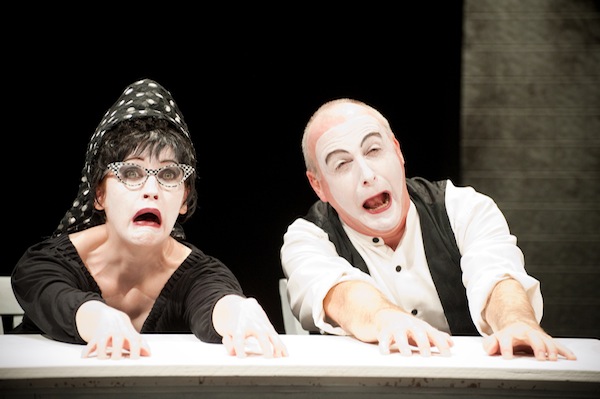Danielle Davy and David Bryan Jackson in Greek. Photograph by Mason Summers, courtesy of Scena Theatre
☆☆ stars out of four
With any Greek tragedy, it’s safe to assume that things are going to get messy. But when transported to the seedy streets of modern-day London and soaked in Guinness, grime, and various bodily fluids, that messiness gets taken to a whole new level. In Steven Berkoff’s Greek, a Scena Theatre production currently playing at the H Street Playhouse, director Robert McNamara slogs his four-person cast through a bawdy British retelling of Sophocles’s Oedipus Rex caked in gritty potential. But while dense material, inventive staging, and mostly powerful performances keep the play afloat and effective, unpolished delivery and other distracting flubs leave something to be desired.
Berkoff originally penned Greek as a commentary on the blight of Margaret Thatcher’s early-1980s England, but since riots and economic crises are familiar headlines again, the parallels he draws to the state of ancient Thebes feel fresh. Here, Oedipus becomes “Eddy” (Eric Lucas), a leather-clad rebel disenchanted with the vile pubs, class warfare, and mindless consumerism surrounding him. On a journey away from home, Eddy encounters passionate love, wealth, and the disturbing truth about his own identity—not to mention a particularly sassy sphinx. Most of the show’s laughs come from Berkoff’s graphic and hypersexed script, but vaudevillian physical comedy, complete with mimelike makeup and exaggerated movements, help, too.
As Eddy’s father, David Bryan Jackson stands out as starkly as his white-powdered face, stealing even his background scenes with sharp expressiveness and charisma. Helen Hayes Award–winner Nanna Ingvarsson, with watery eyes and writhing sexual energy, has an easy command of the stage as Eddy’s wife. And as Eddy’s “mum,” Danielle Davy offers a surprisingly eerie quality with a kick of cartoonish comedy. The play does a good job of showcasing all three supporting actors in individually memorable scenes—especially Davy, whose terse, sharp-tongued rant about women and sexism as the stoic Sphinx garners its own round of applause. But in such a word-driven production, it’s the central character of Eddy himself who falls short, stumbling over tightly packed monologues and getting tangled in his cockney delivery to the point that the material’s meaning, cues, and energy are uncomfortably interrupted. Still, the power Greek could have shines through in a handful of scenes, and when Lucas has a handle on his performance, it shows.
Despite sometimes-uneven character portrayals, the actors never fail to entertain on the minimalist stage, set with only a wooden table and chairs. Creative production choices use all four actors as set pieces, props, and sound effects—what sounds like a cacophony of sirens is the actors’ wailing, and the beaded curtains in a fortune teller’s tent are communicated by dangling arms and legs. Innovative direction bolsters drama throughout the play, particularly when the acting feels shaky.
Reenvisioning a classic is always tricky, but McNamara’s environment of sex, crime, and muck adds a filthy but fitting new layer to the already twisted tale. This telling is a series of ups and downs, both for its dramatic storyline and for the actors’ climactic triumphs and deflating fumbles. With a little more punch and polish, the R-rated show could achieve the shocking juxtaposition of scatological comedy and searing social commentary it’s going for. For now, however, the engaging, mud-and-grunge-steeped romp could stand to clean up its act a little.
Greek, a Scena Theatre production, is playing at the H Street Playhouse through November 27. Tickets ($16 to $40) are available at Scena Theatre’s Web site.

















